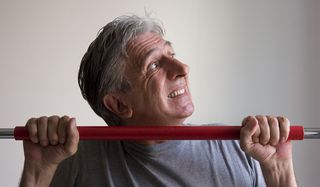What Are the Signs of Male Menopause?

Question: My husband told me he has no energy to do chores around the house because he's suffering from male menopause. He's a very funny guy.
Answer: Your husband was obviously trying to yank your chain, but there's some truth in his joking. Fatigue is a common symptom of male menopause, also known as andropause (andro means male).
Both andropause and male menopause are used to describe decreasing levels of the male hormone testosterone that come with aging. Most men see testosterone levels drop as they get older. Some have described andropause as puberty in reverse.
Age-related decline in testosterone levels is also called testosterone deficiency, androgen decline in the aging male (ADAM) or late onset hypogonadism (LOH).
Andropause is different from the menopause women experience. In menopause, the production of female hormone drops suddenly. In men, there's a gradual decline in hormone levels.
When men reach about 40, testosterone levels usually begin to drop about one percent a year. The reduction is rarely noticeable in men younger than 60. By the time men reach their 80s, about half have low testosterone.
Young men often have testosterone levels exceeding 1000 nanograms per deciliter (ng/dl). The average testosterone level in 80 year-old men is 200 ng/dl.
Sign up for the Live Science daily newsletter now
Get the world’s most fascinating discoveries delivered straight to your inbox.
Some men maintain normal testosterone levels into old age. And there are men with low testosterone levels who have no symptoms. The only sure way to learn if you are low on testosterone is by taking a blood test.
The following are some symptoms of low testosterone: diminished sex drive, reduced muscle bulk and strength, night sweats, infertility, fewer spontaneous erections, depression, loss of body hair, swollen breasts, palpitations, shrunken testes, height loss, fatigue, irritability, reduced self-confidence, poor concentration, memory loss, sleep problems, increased body fat and anemia.
It is normal for erections to occur less frequently in older men than in younger men.
However, erectile dysfunction (ED) is usually brought on by medical or psychological causes, not simple aging. About 90 percent of ED is believed have medical origins such as drugs taken to treat high blood pressure.
Here are some recommendations to deal with andropause:
- See your doctor for a check-up. Discuss symptoms, medications you are taking, treatment options and lifestyle changes.
- Many older men suffer from undiagnosed depression. Depression in men can be more than feeling down. Depressed men can be irritable and withdrawn. They often work too much, drink to excess and try to get thrills from taking risks. If you think you might be depressed, get help.
- Regular exercise helps physically, mentally and emotionally.
- Eat a healthy diet.
Testosterone replacement therapy (TRT) is the primary treatment for declining levels of testosterone, but it is enveloped in controversy. It has helped some men, but TRT has risks, especially for men with prostate cancer and heart disease. And, TRT may not improve symptoms. More studies need to be done to determine the safety and efficacy of TRT.
There are claims that herbal supplements can relieve symptoms. Not one of these supplements has been proven to be safe and effective for age-related low testosterone.
If you would like to read more columns, you can order a copy of "How to be a Healthy Geezer" at www.healthygeezer.com .
All rights reserved © 2011 by Fred Cicetti
More from the Healthy Geezer:
